Last summer I attended three book talks by Cynthia Barnett, author of The Sound of the Sea: Seashells and the Fate of the Oceans. Last week I was able to see her again online when she teamed up with the ever-witty Craig Pittman (The State You're In: Florida Men, Florida Woman and Other Wildlife) to talk about their new books as part of the Times Festival of Reading.
I have always loved author talks. But the pandemic has provided me with an unsettling number of occasions to attend them. I know a lot of people can't wait to get into a room with a lot of other people and are not fans of Zoom. I get that. But my secret addiction is listening to authors yak about books in the comfort of my home.
Last fall alone I dropped in on Patricia Engel (It's Not Love, It's Only Paris) in a series called Writing Brilliant Essays; Rebecca Solnit and Maxine Hong Kingston at meetings of the California Book Club; Michael Posner on Leonard Cohen at the Toronto Book Festival; Ta-Nehesi Coates (Between the World and Me), Cathy Park Hong (Minor Feelings), Nikole Hannah Jones (1619 Project), Heather McGhee (The Sum of Us: What Racism Costs Everyone and How We Can Prosper Together) and Adam Serwer (Cruelty Is the Point: Essays on Trump's America) at a Banned Books Week event sponsored by Random House;
Wole Soyinka (Chronicles From the Land of the Happiest People on Earth) at the New York Public Library; Eric Larsen talking about No One Goes Alone, his new audio-only ghost story, courtesy of AARP; Jeff Klinkenberg (Son of Real Florida) and Janisse Ray (Wild Spectacle) lamenting the loss of habitat in a conversation offered by Tombolo Books; Lori Gottlieb (Maybe You Should See Someone) with Nedra Tawwab Glover (Set Boundaries, Find Peace) exchanging views on therapy; Lauren Groff (Matrix) at the Times Festival of Reading; and an interview of Gary Shteyngart (Our Country Friends) by the actor Fred Savage, offered by Book Soup.
Sometimes I wanted to "meet" the author because I already had read and admired their books. Others lured me in because I wanted to see if they would convince me to add their titles to my long "to read" list after I heard them speak.
Cynthia Barnett holds the record though. Who knew shells could be so interesting? The first time I heard Barnett speak was at an in-person talk, entitled “Marveling at Nature,” held July 11 at Tampa Bay Watch in Tierra Verde.
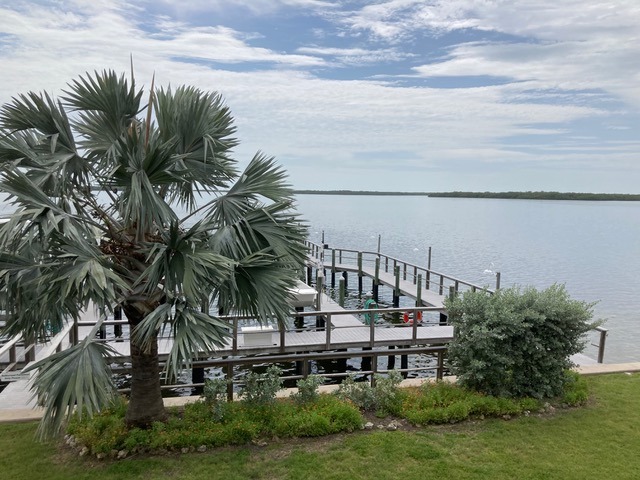
The next time I heard her talk was online on July 19, Books & Books in South Florida sponsored an online talk called “Listening to Sea Shells” featuring WLRN environmental reporter Jenny Staletovitch interviewing Barnett.
Then the next day Tombolo Books of St. Petersburg offered “Sound of the Sea: Seashells, the Gulf and the Writing Life” online and I couldn't resist tuning in again. This time Floridan historian Jack E. Davis, the author of The Gulf, took on the role of interviewer.
At the in-person event there was a slide presentation (including Botticelli’s Birth of Venus with the goddess on a giant scallop shell), a fabulous view of Tampa Bay, wine for sale by St. Pete’s Book+Bottle bookstore and — finally after more than a year of lockdown — a roomful of people talking face-to-face.
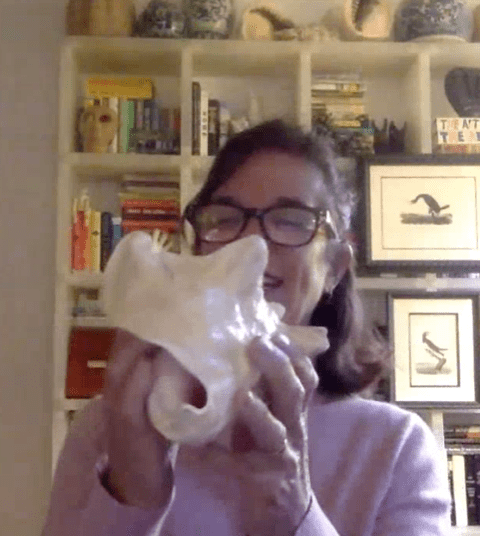
At the virtual meet-ups, there were people in squares talking to each other, no wine, no water views and no slides. There was, however, the chance to catch a glimpse of Barnett’s bookcases in her Gainesville home (where she lives with her husband and their two teenagers), an impromptu one-woman conch concert by Staletovitch (following a request in the chat by a friend who knew she had a conch shell trumpet in her Miami study) and a brief barking commentary provided by Davis’ dog in his residence just outside Gainesville.
Staletovitch and Barnett are both environmental journalists. Barnett teaches environmental journalism at the University of Florida’s College of Journalism and Communication, but for 25 years she was a newspaper and magazine reporter, more than half that time as senior writer for Florida Trend magazine in St. Petersburg.
Davis, who teaches environmental history and sustainability studies at the University of Florida, and Barnett, are both book authors. Davis’ book, The Gulf: The Making of an American Sea, won the Pulitzer Prize in 2018. Barnett has written three books about water-related issues. The Sound of the Sea completes, as Barnett likes to put it, her “hydroponic order.”
Of course, the online sessions couldn’t hope to compete with the setting of Barnett’s in-person Tampa Bay event. What better place to hear a talk about the need to save our oceans than at Tampa Bay Watch? The striking blue and white building that houses the nonprofit organization, dedicated to protection and restoration of our local estuary, sits on Pinellas Bayway South in Tierra Verde, providing spectacular views of the Bay.
The talk was held in the building’s second-floor Bay View Community Center. At the back is a balcony that overlooks a dock and a wide water view stretching to the horizon. I stepped out to peer down on the sparkling waters of the Bay, grateful that I didn’t see any dead fish or get a whiff of any of the red tide bloom that had been stinking up the Bay that week.
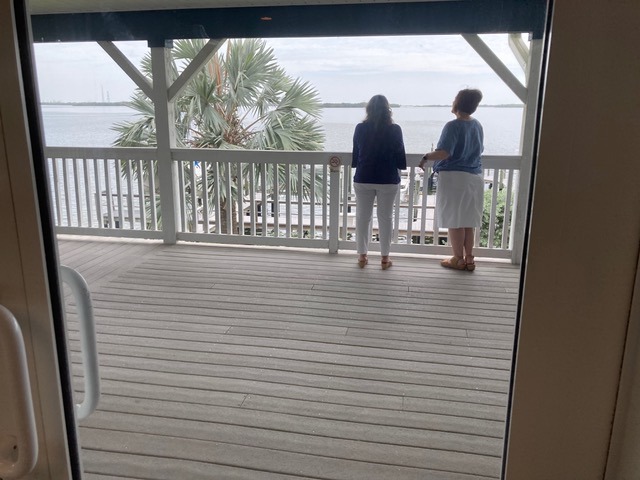
Behind me the room was filling up with people, most of them lined up to buy a copy of Barnett’s book and a glass of wine sold by Terra Dunham of Book+Bottle, a St. Petersburg bookstore that stocks both. Dunham was returning $2 back to Tampa Bay Watch for each book sold.
When I stepped back into the room, Peter Clark, founder and president of Tampa Bay Watch, was giving a shout out to writers in the room, including Gary Mormino, a Florida historian who has several books under his belt. Steve Seibert, former executive director of Florida Humanities and one of the event's sponsors, then introduced Cynthia Barnett as an international author with Florida roots (she’s a fifth generation Floridian). She is, he said, quoting the Boston Globe, “part journalist, part mom, part historian, part optimist.”
Barnett told lots of engaging stories about shells. How her daughter became obsessive about collecting them when she was five, a practice that dates back to the Neanderthals. How cowrie shells, the first global currency, were used during the African slave trade (an estimated one-third of enslaved people were paid for with the tiny white shells). She talked about the origins of the Shell Oil Company and the pioneering work being done by a number of largely unsung female marine scientists.
At the end of the talk she fielded questions and answers from the audience about red tide and the ethics of collecting sea shells (she’s in favor, but only in moderation), often yielding the floor to Steve Geiger, a research scientist from the Florida Fish and Wildlife Conservation Commission who specializes in mollusks.
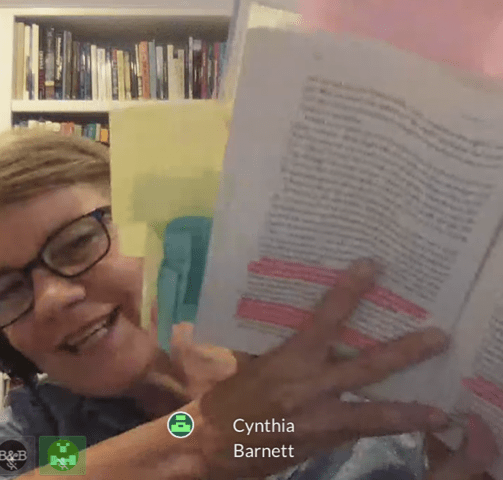
I learned a lot about seashells from her at the in-person talk, but I learned even more during her one-on-one conversations online. I learned, for example, that not all mollusks are seashells. Snails in our gardens are mollusks. Mollusks are the second largest group of animals in the world behind insects. They are all over land as well as the sea. But in The Sound of the Sea, Barnett writes exclusively about marine mollusks. That is, shells.
In the book Barnett concentrates on 12 iconic marine mollusks, choosing among the more than 50,000 species identified by scientists. She chose these particular seashells — including the cowrie shell, the bay scallop and the conch shell — because they allowed her to tell both a story of human history and the impact of climate change.
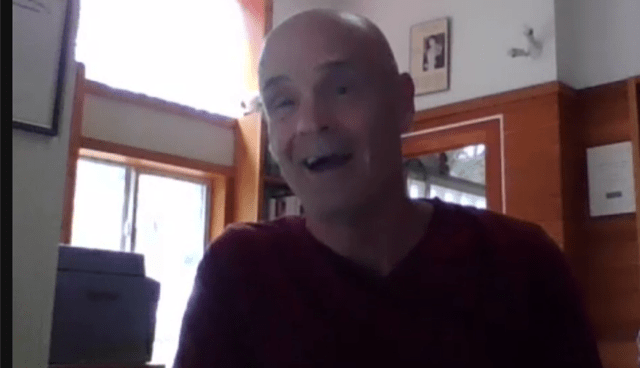
It was Davis who asked Barnett to define mollusks. He also challenged her to sum up her book in two sentences. She did it for him in one. “This book is about listening – about listening to nature, about listening to unheard voices, and listening to what the Earth is telling us about climate change and how we treat each other.”
The in-person talk was like sitting in a classroom listening to a lively and interesting teacher. The online sessions, on the other hand, were more intimate, quirky affairs that felt more like sitting in a living room eavesdropping on a conversation between good friends.
Both Staletovitch and Davis are writers themselves, so they naturally talked with Barnett at length about her writing process, something missing from the in-person presentation. Barnett humorously described to both of them the many false starts she had with this project, including an attempt to start the book with a story about marble and Michelangelo (marble being an all-natural stone that was formed by limestone which itself was originally formed by seashells). Eventually she was forced to abandon that ponderous opening and ended up simply starting the book by telling the personal story about her daughter collecting seashells instead, imagining that the first seashell collector was also a little five-year-old girl.
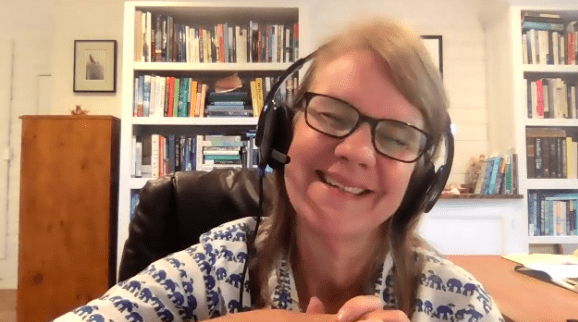
“Seashells are a home and they are a metaphor for our home, the Earth and what’s happening to our home,” she told Davis to whom she admitted that “this was my hardest book to write. It took six years to finish.”
Since her book’s launch on July 6 at Third House Books in Gainesville, Barnett has given an insane number of talks, both in-person appearances and virtual, including the latest with Craig Pittman at the Time Festival of Reading. According to her website she has seven more coming up -- all in person.
So which is better? An in-person book talk or a virtual one? Which one is the more pleasant and informative experience?
Personally I welcome the return of in-person books talks, but I confess I'm still hoping authors continue to include online sessions as part of their book tours.
Maybe I’m hoping for another conch concert.
A version of this article was originally posted on July 27, 2021, in Arts Coast Journal, the online journal for Creative Pinellas.
